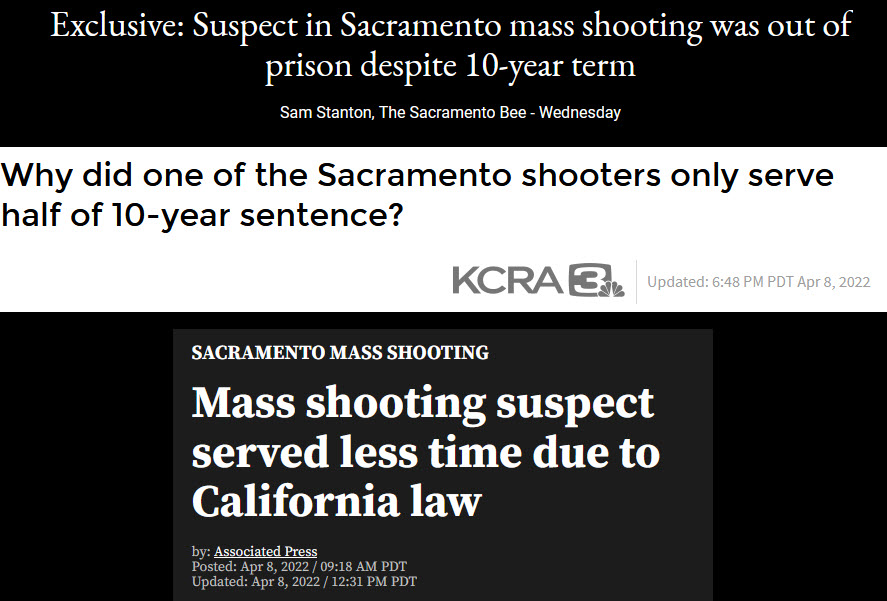

By David M. Greenwald
Executive Editor
Sacramento, CA – It immediately set off a red flag when the Sacramento Bee first reported that a suspect in the Sacramento mass shooting was out of prison despite a 10-year term and it became clear that the media and law enforcement were going to use this tragedy to push back against sentencing and other criminal justice reform.
The LA Times Editorial Board on Monday blew up the entire narrative.
They nailed it: “Much of what you heard last week about a suspect in the killing of six people in Sacramento the previous Sunday was patently false — that ‘the perpetrator’ was able to do his ugly deed because he had been released from prison years early by Gov. Gavin Newsom’s soft-on-crime parole board despite warnings from the district attorney.”
The Times quotes perhaps Mark Twain: “A lie can travel halfway around the world while the truth is still putting on its shoes.”
The Times points out that no one has actually been charged with the killings and the three men in custody were only charged—as we pointed out last week—“with firearms-related crimes.” That includes Smiley Martin, “about whom so many of the inaccurate claims were circulated by politicians and news outlets.”
I’m glad the LA Times called out fellow news outlets because, frankly, they bear a lot of the responsibility for a lot of the crime narrative that has spun into the realm of inaccuracy for well over a year.
But as it turns out, not only was Martin not the actual shooter, he actually was not released early.
Writes the Times, “News reports cited objections that Sacramento County Dist. Atty. Anne Marie Schubert’s office made to Martin’s 2021 parole request, but they had nothing to do with his actual release. By February 2022, he had served his full sentence.”
Indeed, “No one — not the Department of Corrections and Rehabilitation, not Schubert, not the Board of Parole Hearings — had any discretion or authority to keep him in prison a day longer than he was there.”
How that is the case is an interesting story that apparently no one looked into.
What they found is that many misuse the term “early release” and forget that the months and sometimes years before trial and that time counts as part of their sentence. That’s what happened to Martin.
The Times reports that Martin was held in custody for 508 days before he plead no contest and was sentenced to 10 years.
Writes the Times, “Everyone involved — the prosecutor, the judge, the prison warden and probably even the victims — knew from the start that a 10-year sentence meant at most five years, because of required good conduct credits at a rate of one day of credit for every day served.”
They point out, “Good conduct credits are not some new, soft-on-crime invention. They have been embedded into California law (and most other states) for decades.”
He also earned some credits—“additional days as an incentive for completing rehabilitation and education programs, made available or expanded under Proposition 57, which was approved by voters in 2016 and was on the books when the plea bargain was negotiated the following year.”
Writes the Times, “Should we want criminals to earn time off their base sentences by participating in programs like cognitive behavioral therapy and anger management, or for completing their high school degrees or skills training? Of course.
“There’s an honest discussion to be had about whether an expanded credit program is worth the cost or effort. The proof should be in the numbers. If recidivism rates for participants are lower, it’s probably worth it,” they continue. “In any event, Martin’s case was unaffected by the latest proposed credit expansion.”
But here is a critical point: “At the beginning of last week, anger against Newsom focused on his parole commissioners, who supposedly released Martin over Schubert’s principled objections — until a simple check of the facts revealed that there was no parole board involvement in the release.”
Maybe we should be asking how a veteran Sacramento Bee reporter missed this?
The Times points out: “A decade ago, critics of criminal justice reform tried to score points by blaming high-profile crimes on laws that put people released from prison under the supervision of county probation officers instead of state parole agents, although both have had successes and failures with their caseloads. Then the complaints focused on Proposition 47, which was blamed for the recent spate of “smash and grab” robberies — even though the measure has nothing to do with robberies. So the half-truths about credits and the falsehoods about parole boards shouldn’t be surprising.”
One of the points we made last week is the failure by the media to put these kinds of stories into context. It is easy to point to Willie Horton or Troy McAlister—the guy released who does something terrible, without reporting the full picture that those are few and far between and there is a reason why we know those names as opposed to the many who get out and get their lives back in order.
But it’s worse than that. The media actually completely blundered the story—maybe at the behest of DA Anne Marie Schubert. Maybe by their own sloppiness or eagerness to break the news that puts another black mark on criminal justice reform efforts.


O.K. – released “too soon”.